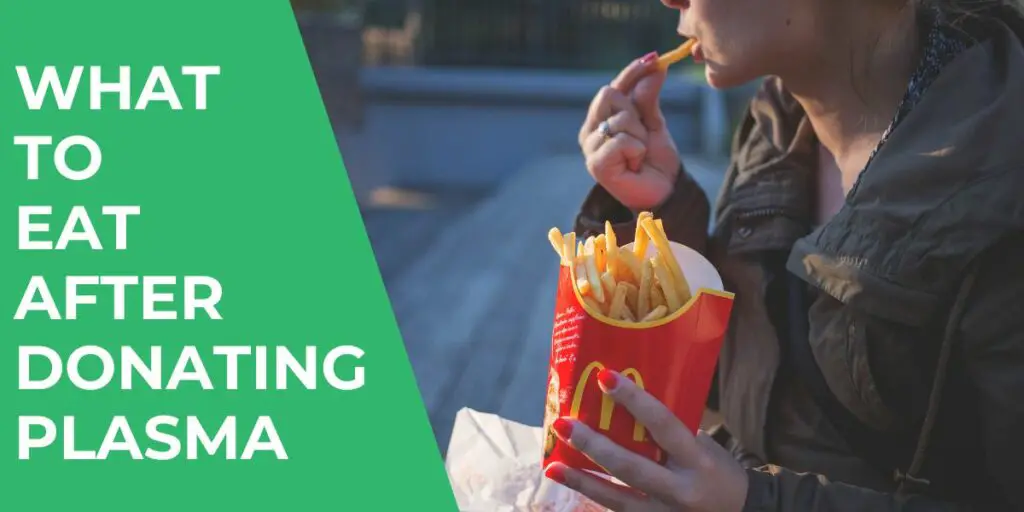
Just last week, I found myself in a comforting recliner, the subtle hum of machinery in the background as I made my regular plasma donation.
As I left, one question nagged me – what should I be eating post-donation to properly replenish my body?
So, if you’ve ever pondered what to eat after donating plasma, you’ve come to the right place.
What to Eat After Donating Plasma?

These are What to Eat After Donating Plasma:
1. Chicken Soup
Chicken soup is a classic food to eat when you are feeling under the weather. It is also a great option to eat after donating plasma. The chicken broth will help to replenish your fluids and the vegetables in the soup will provide you with essential vitamins and minerals.
2. Oatmeal
Oatmeal is a great source of complex carbohydrates which can help to give you a boost of energy. It is also a good source of fiber which can help to keep you feeling full. Adding a little honey or fruit to your oatmeal can also help to increase its nutrient content.
3. Eggs
Eggs are a good source of protein which can help repair and rebuild your muscles. They are also a good source of Vitamins A, D, and E which can all be beneficial for your skin and hair. Eating eggs that are cooked in healthy fats such as olive oil can also help increase their nutrient content.
4. Yogurt
Yogurt is a great source of probiotics that can help to improve your gut health. It is also a good source of calcium and protein. Adding some fruit to your yogurt can also help increase its nutrient content.
5. Salmon
Salmon is a great source of omega-3 fatty acids which have been shown to have numerous health benefits. Salmon is also a good source of protein and vitamin D. Adding some lemon juice or herbs to your salmon can also help increase its flavor.
6. Leafy Green Vegetables
Leafy green vegetables such as spinach and kale are packed with nutrients including vitamins, minerals, and antioxidants. These nutrients can all be beneficial for your health. Adding leafy greens to smoothies, soups, or eggs can be a great way to increase their nutrient content.
7. Sweet Potatoes
Sweet potatoes are a great source of complex carbohydrates which can help to give you lasting energy throughout the day. They are also packed with nutrients including vitamins A, C, and B6 as well as potassium. Adding sweet potatoes to roasted vegetable dishes or soups can be a great way to increase their nutrient content.
8. Quinoa
Quinoa is a great plant-based source of protein which makes it perfect for vegetarians and vegans. It is also a good source of fiber and vitamins B1, B2, and B6. Adding quinoa to salads or veggie bowls can be a great way to increase its nutrient content.
9. Beans and Lentils
Beans and lentils are another great plant-based source of protein as well as a good source of fiber and iron. Adding them to soups, salads, or veggie burgers can be a great way to increase their nutrient content.
If you’re also curious about how to properly fuel your body before your donation, check out our guide on What to Eat For Breakfast Before Donating Plasma.
What to Eat After Donating Plasma: Top 12 Healthy Meals and Snacks
These are the top 12 healthy meals and snacks to eat after donating plasma:
- Spiced Lentil Soup: This soup is packed with protein and fiber, both of which are important for maintaining energy levels.
- Fruity Chicken Salad: This salad is a great source of lean protein, healthy fats, and vitamins and minerals.
- Creamy Avocado Toast: This toast is a great source of healthy fats and fiber.
- Vegetable-Packed Stir Fry: This stir fry is a great source of vitamins, minerals, and antioxidants.
- Energy-Boosting Smoothie: This smoothie is a great way to replenish electrolytes and boost energy levels.
- Greek Yogurt & Berries: This snack is a great source of protein, calcium, and antioxidants.
- Hard-boiled Eggs and Toast: This snack is a great source of protein and healthy fats.
- Hummus & Veggies: This snack is a great source of protein, fiber, and healthy fats.
- Nut Butter & Bananas: This snack is a great source of healthy fats, fiber, and potassium.
- Kale Chips & Salsa: This snack is a great source of vitamins, minerals, and antioxidants.
- Trail Mix: This snack is a great source of protein, healthy fats, and vitamins and minerals.
- Apple Slices and Cheese: This snack is a great source of protein, calcium, and healthy fats.
Now that we’ve covered what to eat post-donation, it’s also essential to know what to avoid before your appointment. Check out my guide on what not to eat before donating plasma for the complete rundown.
What’s the Best Food to Eat After Donating Plasma?
The best foods to eat after donating plasma are those rich in iron and protein to replenish nutrients, and complex carbohydrates to maintain blood sugar levels. This includes lean meats, fish, legumes, dark green vegetables, whole grains, and nuts.
If you’re interested in learning more about incentives for plasma donation, check out our article on the Bonus for CSL Plasma This Month.
Can I Eat Anything After Donating Plasma?
Yes, you can eat anything after donating plasma, but it’s best to opt for healthy and balanced foods. Staying hydrated and replenishing iron is key. Avoid alcohol and caffeinated beverages as they can lead to dehydration. Too much fatty food isn’t recommended as it can affect the quality of your plasma for future donations.
How Soon Can I Eat After Donating Plasma?
It is recommended to eat immediately after donating plasma. Eating within the first two hours post-donation will help replenish the body’s nutrients, stabilize blood sugar levels, and reduce the chance of experiencing dizziness or lightheadedness.
If you want to learn about potential complications and how to avoid them, check out our related article on instances of Plasma Donation Gone Wrong.
Things to Avoid After Donating Plasma
These are the Things to Avoid After Donating Plasma:
- Alcohol: Avoid drinking alcohol for at least 24 hours after donating plasma. Alcohol can lead to further dehydration and potentially exacerbate any feelings of dizziness or lightheadedness.
- Caffeinated Drinks: Similar to alcohol, drinks like coffee and energy drinks can cause dehydration. It’s best to stick with water and other hydrating beverages.
- Heavy Physical Activities: Avoid any heavy lifting or intense workouts for the rest of the day after you donate. These activities can increase your heart rate and might lead to dizziness.
- Foods High in Sodium and Sugar: While some sodium is necessary for hydration, foods that are excessively salty or sugary can lead to further dehydration and imbalance of your electrolytes.
- Iron Inhibitors: Avoid foods that can inhibit iron absorption, like coffee, tea, and high calcium foods, immediately after your meal.
Signs that I Might Not Be Eating the Right Foods After Donating Plasma
These are the signs that I Might Not Be Eating the Right Foods After Donating Plasma:
- Prolonged Fatigue: While it’s normal to feel a bit tired after donating plasma, prolonged fatigue might indicate that you’re not getting enough nutrients, particularly iron and protein, to help your body recover.
- Dizziness or Lightheadedness: If these symptoms persist even after resting and hydrating, it might indicate low blood sugar levels or inadequate hydration. It’s important to consume balanced meals and hydrate adequately after donation.
- Slow Recovery: If you’re noticing that it’s taking longer than usual for your donation site to heal, or if you’re feeling unusually weak for days after donation, this could be a sign that your body is not getting the nutrients it needs to recover.
- Changes in Mood: If you’re feeling more irritable or having trouble focusing, you might not be getting enough nutrients like iron and B vitamins, which are important for cognitive function and mood regulation.
- Pale Skin: This can be a sign of iron deficiency. Iron-rich foods are particularly important after blood or plasma donation.
- Increased Heart Rate: If you notice an increased heart rate or palpitations, this could be due to dehydration or electrolyte imbalances. Make sure to hydrate well and eat balanced meals.
FAQs on What to Eat After Donating Plasma
These are the most frequently asked questions on What to Eat After Donating Plasma:
Can I donate plasma if I’m on a specific diet (vegan, gluten-free, keto, etc.)?
You can donate plasma if you’re on a specific diet like vegan, gluten-free, or keto.
Why do I need to eat iron-rich foods after donating plasma?
This is because plasma donation involves a minor loss of blood components, including red blood cells which contain iron.
How can I stay hydrated after donating plasma?
Drink plenty of fluids before and after donation, at least 2-3 liters throughout the day. Include water-rich foods in your diet. Avoid drinks like coffee and alcohol that can dehydrate you.
Why is it important to avoid alcohol after donating plasma?
Avoiding alcohol after donating plasma is important as it can lead to dehydration and thinner blood.
Conclusion
In conclusion, knowing what to eat after donating plasma is essential for a healthy recovery. Incorporate iron-rich foods, proteins, and hydrating fluids into your meals, and avoid alcohol or excessive caffeine.
Those on specific diets can still donate but should ensure a well-rounded nutrient intake. Paying attention to post-donation dietary choices ensures a swift recovery and readiness for future plasma donations.
